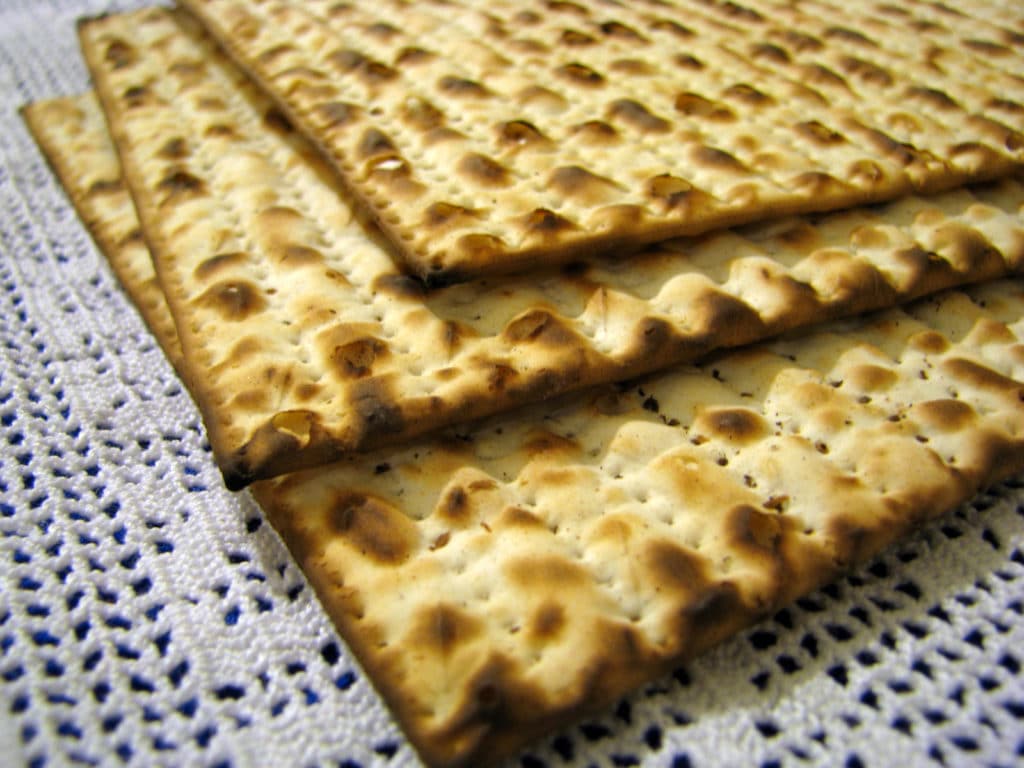One of my most vivid memories from childhood is spending the week of Passover in the basement. Why the basement? Because the house my parents bought had a little kitchen down there. Rather than go through the work of making our regular kitchen kosher for Passover, my folks realized it would be easier just to move downstairs for the week.

In the days leading up to the holiday, I remember spending time with my Mom helping her make recipes for the seder, including chocolate brownies (yes, I got to lick the bowl) and her famous strawberry poof, which we continue to make today.
I remember the special dishes we used. I remember polishing the silver.
And I remember this door at the end of the hallway in the basement—a door which led outside, but which we really never used, except on seder night when we opened it to welcome Elijah the Prophet. Somehow or other I remember it was always my job to go to the end of the hall and open that door, and I remember feeling slightly terrified. I’d open the door and then immediately close it and run back to the family room where the Seder was happening. It still gives me a jolt just to think about it.
But put it all together, and what I hope you’re getting is a sense that Passover, for me, is about home. And that’s by design. While Yom Kippur mostly takes place in the synagogue and Sukkot happens in a hut, Passover—can we call it Pesach? Let’s call it Pesach—is Biblically mandated to take place in our homes. The ancient Israelites, our ancestors, held the O.G. seder inside their homes in Egypt the night before they were freed—and the Torah tells us that every Seder thereafter should happen inside our homes too.
I talked about this theme of being at home in our final episode before Pesach last year, and as I thought about this episode—our final episode before Pesach this year—I really just felt like, you know what? This is it. This is what it’s all about. Pesach is about feeling truly, deeply at home. And part of being a host—whether it’s a host opening the door of your home for seder guests, or the host of a podcast opening the door to listeners who want to practice Jewish mindfulness—is the responsibility of guiding them, guiding you. So, home it is.
When I say that Pesach is about feeling truly, deeply at home, I don’t mean that it’s about being in the house you grew up in (which may or may not be a pleasant place in your memory). No, I mean that Pesach is, as we say in Hebrew, chag hacherut, our festival of freedom, and genuine freedom is when we can feel truly at home on the deepest levels—in our bodies, in our identities, in the place where we are, in the universe.
Genuine freedom is, yes, when we’re not oppressed by a government, like Pharaoh’s, that’s enslaving and oppressing us. But it’s also when we’re not enslaved and oppressed by the psychological and spiritual forces that operate inside us, the constraints of our own minds and hearts.
We’ve talked about this before on this podcast, that the Exodus isn’t just a one-time event that happened to our ancestors 32 centuries ago. No, the Exodus, yetziat Mitzrayim, happens all the time—anytime we find spaciousness where there was narrowness, where we create expansiveness in our inner lives where there was constriction. We are always leaving Egypt—every week through Shabbat, every day through remembering the Exodus, every breath and every moment.
You can do that on our own, and the practices we share on this show can help you. But part of the challenge and opportunity of the Seder is to do it with other people, to experience freedom and at-homeness in the context of family and community.
To help do that, I want to re-up something I shared on last year’s pre-Passover episode, which are a set of guidelines we’ve developed at the Institute for Jewish Spirituality that we call “Making safer spaces.” We read these aloud at the beginning of retreats and courses we teach. Other groups and organizations have other kinds of documents like this: communication agreements that are designed to make the space safe enough for all of us to be there.
What I want to suggest to you is that, at your seder, you invite everyone to agree to some basic ground rules like these. For instance:
- Presume and extend welcome to others, because everyone is welcome here.
- Speak in the first person, about your own experience.
- When you notice judgment arising in you, try to meet it with curiosity rather than conviction (that may be particularly helpful for some relatives, or maybe for you).
- Remember that everyone here is fighting battles no one else knows about–so let’s welcome and embrace each other. That doesn’t mean we have to agree. But it means that tonight we agree to listen compassionately to one another.
You can develop your own–and you can invite folks to contribute their ideas before or during the Seder too. The general point is to be explicit about creating a container–because that’s what the Seder is, a container for all of us to feel welcome, to feel liberated, to experience being truly, deeply at home.
Chag kasher v’sameach: Blessings for a joyful, reflective, and meaningful homecoming and liberation this year.